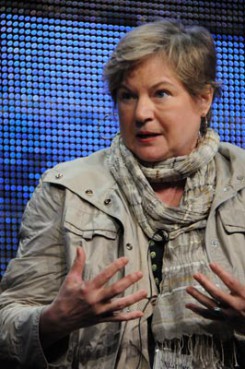
(RNS1-SEP29) Marilyn Mellowes is Series Producer for “God in America,” airing Oct. 11-13 on PBS stations. For use with RNS-10-MINUTES, transmitted Sept. 29, 2010. RNS photo courtesy WGBH.
(RNS) PBS’ American Experience and Frontline explore the role of religion in American life across more than 400 years in the six-hour series “God in America,” which will air over three consecutive nights starting Oct. 11.
The journey interweaves historical dramatizations, interviews with scholars and documentary footage, covering themes such as the complexities of religious liberty, competition in America’s religious marketplace and religion as a source of social reform.
Series Producer Marilyn Mellowes talked about developing the series, its timely relevance and what she hopes audiences will take away. Some answers have been edited for length and clarity.
Q: How did you get involved with the series?
A: Around 2004, I became worried about the ways religion and politics were intersecting in this country. I felt that the nature of that engagement had changed and it had become somewhat toxic in ways that I felt endangered our political process, our belief in conducting intelligent national discourse.
So I started to think of ways public television could help address that. It wasn’t one blinding moment of the road; it evolved slowly and over time. One thing I hope this series does is show that religion and politics — and political life more broadly — have always been engaged.
Q: How do you fit 400 years of American religious history into a six-hour documentary series?
A: It’s very daunting. I did have my moments when I thought, “How am I ever going to figure this out?” But I’m lucky. I’m sort of naturally a curious person and so I started reading and I started scribbling and talking to people. And as I read and listened to scholars, there were a number of themes that really started to come to the fore. And they did ultimately become the scenes that have structured the series, the intellectual architect as it were.
Q: Why is it important to have the series air now?
A: The issues around religion and politics will ebb and flow but they’re never going to go away. We had an idea that we thought was important and had an evergreen quality to it, as we sometimes say in this business. It’s always been with us, and it always will be with us.
Q: A major part of the series is historical re-enactments from notable actors, like Michael Emerson playing Puritan John Winthrop. What was the impetus behind these re-enactments?
A: Part of the challenge that Director David Belton faced was telling these stories without readily available, visual material. He brought with him a great deal of imagination, and a willingness to really think hard. He did not want to do what you so often see in re-enactments, in which the footage just is kind of like wallpaper — like a street scene in colonial Virginia where two women are walking down a unpaved road and they’re carrying baskets of bread.
He really succeeded in giving the actors a deep understanding into the interior lives of their characters. So when you see Michael Emerson play John Winthrop, every scene he says is absolutely authentic — it’s Winthrop’s own words. It’s trying to really reach into the heart of this man for what he believes, how he felt, the ways in which he was conflicted.
Q: How important was it to have actor Campbell Scott as the series’ narrator?
A: The quality of the narrator’s voice is so important. I think we’ve all been pretty happy with Campbell Scott. There is warmth to his voice but there is an edge of surety, too. It’s just right.
Q: What do you believe is the ultimate takeaway from this series?
A: I hope there’s an understanding that religion has shaped our history. I want people to be more informed. I would love to see a whole array of conversations happening across the country about the intersection of politics and religion.
We also hope to give a historical perspective and framework, so that when we’re reading or hearing about the controversy over the Islamic center in New York City, we understand that questions of religious freedom and liberty have a very long history.




